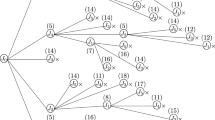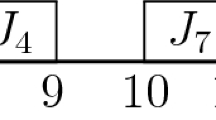Abstract
We consider the problem of minimizing the maximum lateness in a m-machine flow shop subject to release dates. The objective of this paper is to develop a new branch-and-bound algorithm to solve exactly this strongly NP-hard problem. The proposed branch-and-bound algorithm encompasses several features including a procedure for adjusting heads and tails, heuristics, and a lower bounding procedure, which is based on the exact solution of the two-machine flow shop problem with time lags, ready times, and delivery times. Extensive computational experiments show that instances with up to 6000 operations can be solved exactly in a moderate CPU time.
Similar content being viewed by others
References
Al-Anzi FS and Allahverdi A (2004). Empirically discovering dominance relations for scheduling problems. In: Oulamara A and Portmann MC (eds). Proceedings of the ninth International Workshop on Project Management and Scheduling (PMS 2004). Service Re-prographie Institut National Polytechnique de Lorraine, Nancy, France, pp 327–330.
Allahverdi A and Al-Anzi FS (2002). Using two-machine flowshop with maximum lateness objective to model multimedia data objects scheduling problem for www applications. Comput Opns Res 29: 971–994.
Allahverdi A and Aldowaisan T (2004). No-wait flowshops with bicriteria of makespan and maximum lateness. Eur J Opl Res 152: 132–147.
Carlier J (1987). Scheduling jobs with release dates and tails on identical machines to minimize the makespan. Eur J Opl Res 29: 298–306.
Carlier J and Rebaï Ï (1996). Two branch-and-bound algorithms for the permutation flow shop problem. Eur J Opl Res 90: 238–251.
Cheng J, Steiner G and Stephenson P (2001). A computational study with a new algorithm for three-machine permutation flow shop problem with release times. Eur J Opl Res 130: 559–575.
Cheng J, Steiner G and Stephenson P (2002). Fast algorithms to minimize the makespan or maximum lateness in two-machine flow shop with release times. J Sch 5: 71–92.
Gharbi A and Haouari M (2002). Minimizing makespan on parallel machines subject to release dates and delivery times. J Sch 5: 329–355.
Grabowski J, Skubalaska E and Smutnicki C (1983). On flow shop scheduling with release and due dates to minimize maximum lateness. J Opl Res Soc 7: 615–620.
Hall LA (1994). A polynomial approximation scheme for a constrained flow-shop scheduling problem. Math Opns Res 19: 68–85.
Haouari M and Ladhari T (2000). Minimizing maximum lateness in a two-machine flowshop. J Opl Res Soc 51: 1100–1106.
Horn WA (1974). Some simple scheduling algorithms. Naval Res Logist Q 21: 177–185.
Kovalyov MY and Werner F (1997). A polynomial approximation scheme for problem F2∣r j∣Cmax . Opns Res Let 20: 75–79.
Lawler E.L, Lenstra JK, Rinnooy Kan AHG and Shmoys DB (1993). Sequencing and scheduling: algorithms and complexity. In: Graves SC, Rinnooy Kan AHG and Zipkin P (eds). Handbooks in Operations Research and Management Sciences, Vol. 4: Logistics of Production and Inventory. North-Holland, Amsterdam, pp 445–522.
Lenstra JK, Rinnooy Kan AHG and Brucker P (1977). Complexity of machine scheduling problems. Ann Dis Math 1: 343–362.
Potts CN (1985). Analysis of heuristics for two-machine flow shop sequencing subject to release dates. Math Opns Res 10: 577–584.
Potts CN (1980). An adaptive branching rule for the permutation flow-shop problem. Eur J Opl Res 5: 19–25.
Rinnooy Kan AHG (1976). Machine Scheduling Problems: Classification, Complexity and Computations. Nijhoff: The Hague, Netherlands.
Author information
Authors and Affiliations
Corresponding author
Rights and permissions
About this article
Cite this article
Haouari, M., Ladhari, T. Minimizing maximum lateness in a flow shop subject to release dates. J Oper Res Soc 58, 62–72 (2007). https://doi.org/10.1057/palgrave.jors.2602092
Received:
Accepted:
Published:
Issue Date:
DOI: https://doi.org/10.1057/palgrave.jors.2602092




